Majority of Oklahoma Voters Already Vaccinated;
Almost a Quarter Refuse It
Volume 33 No.2 | April 20th, 2021
By Pat McFerron, President
Cole Hargrave Snodgrass & Associate
![]() @McFerron
@McFerron
The most recent Sooner Survey focuses on how voters relate to the Covid pandemic and reveals a great deal about our citizenry. This issue is almost as divisive as all but the most ideological of issues and even starts to approach that of abortion and guns and shows that a virus and the response to it has become an overtly partisan issue.
Voter opinion regarding the most concerning consequence has changed over the past year. In May of 2020, Oklahoma voters were almost evenly divided between those whose primary concerns were the health consequences (43%) and those most concerned with the economic damage created (51%). Today, what was once an eight-point gap is now 34-points with just 29% focused on health issues and 63% more interested in the economic damages. This issue largely divides Democrats (44% Health / 47% Economic), but Republicans are very likely to show greater concern for the economy (76%) than health (16%). Even in the two great metro regions, only 35% say the health risk is their priority while 59% say it is the economy.
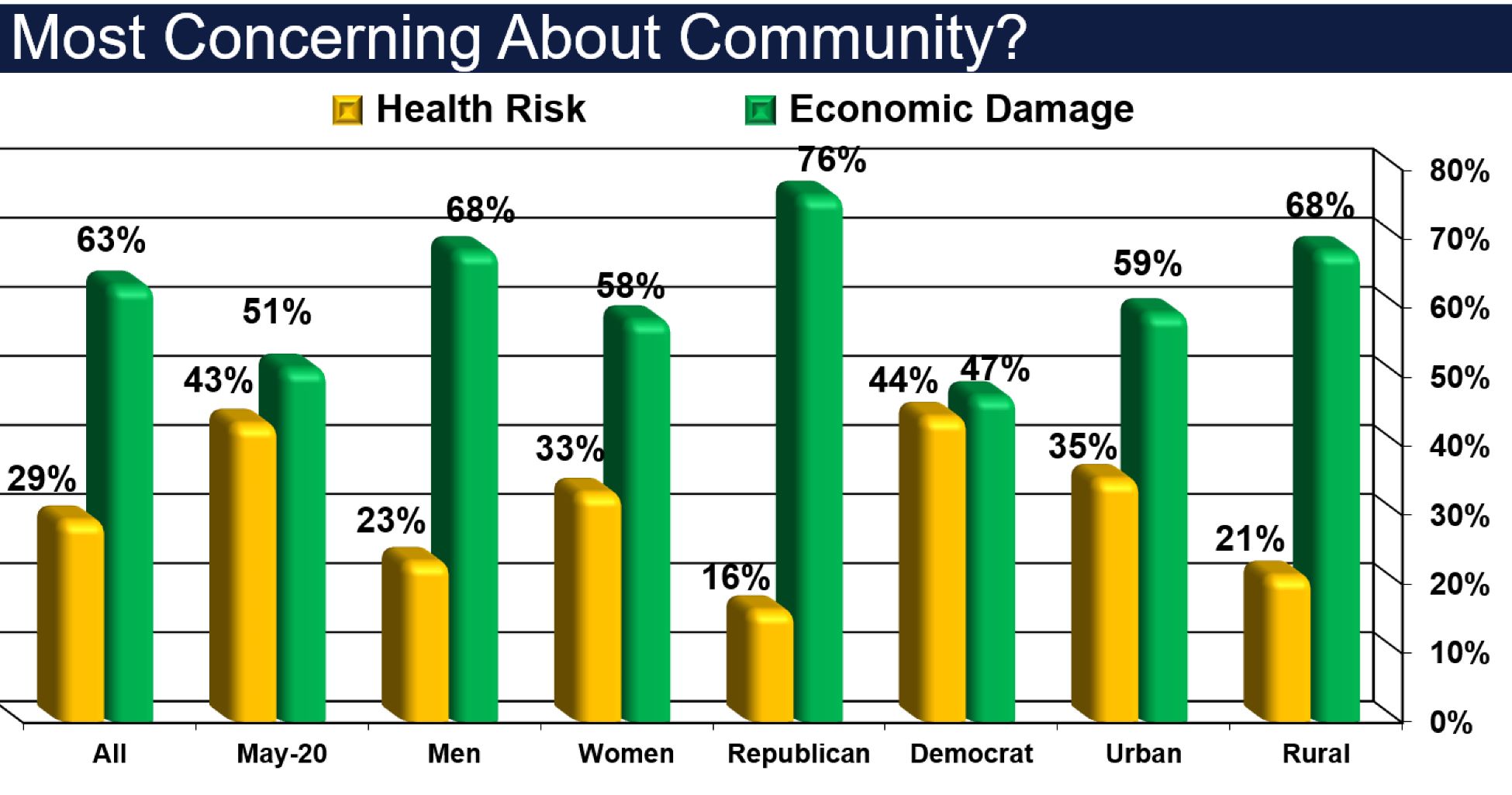
Those who have a concern about the health risks of Covid, as one might expect, are also the most reluctant to believe it is now safe to gather in groups of 10 or more. Again, we see an incredible partisan divide. Fully 59% of Republicans believe it is either okay now (52%) or by the end of April (7%) to gather in large crowds while only 15% of Democrats (14% Now; 1% End of April) hold that belief. There are relatively few (15%) who believe that window will open between May 1 and July 1, while more than a third think it will be after that – and 15% saying such gatherings will have to wait until 2022. Among registered Democrats, 24% say it will be at least 2022 before 10 people can safely be together, and another 32% believe it will be at least past June. The divide is also seen ideologically. Fully 36% of Oklahomans self-identify as “very conservative” and among these voters 62% are ready for gathering this month – while dropping to only 6% among the 11% identifying as “very liberal”.
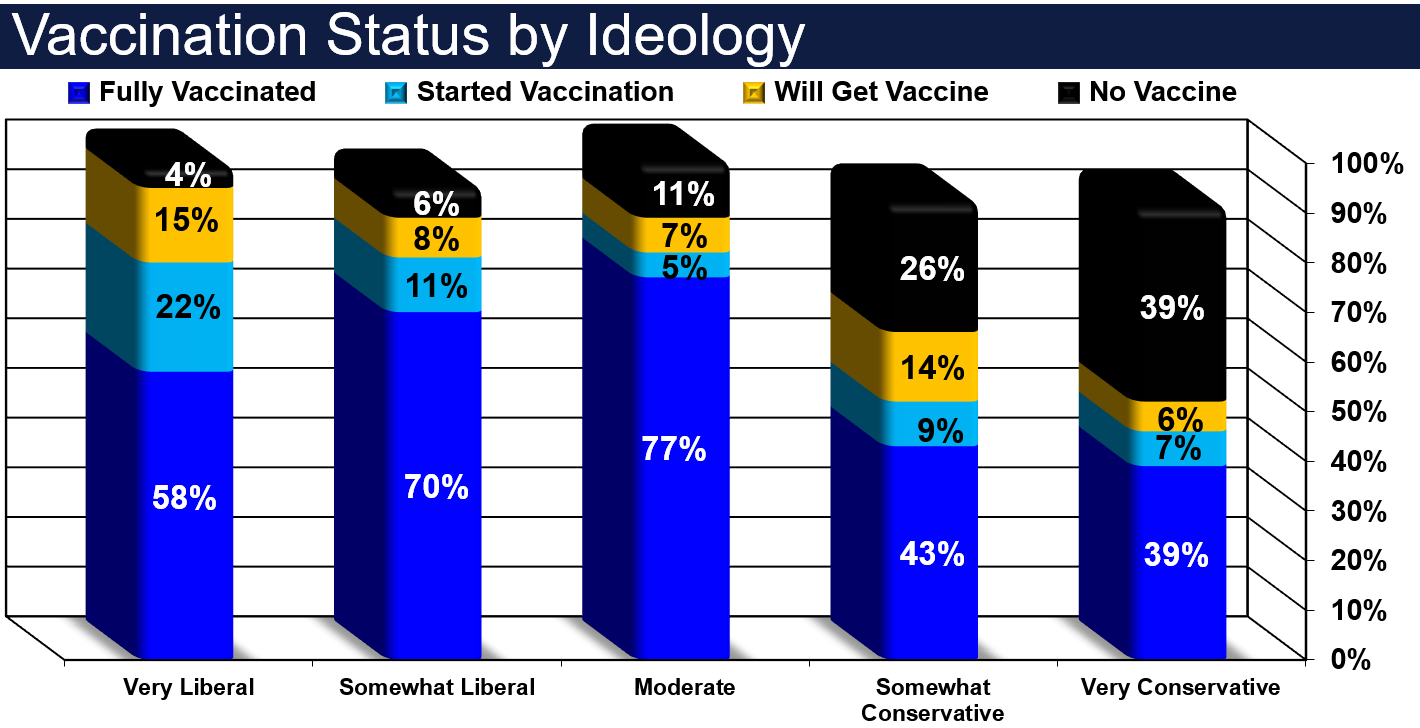
The partisan divide regarding becoming vaccinated exists, but not to the extent of other aspects of the pandemic. Yes, Democrats (58% fully vaccinated) are more likely than Republicans (46% fully vaccinated), but the gap is not as wide as we see on the questions regarding gathering and concern of health vs. the economy. We do see almost a third of Republicans (32%) indicating they will not get vaccinated with only 13% of Democrats in that camp. In the 71 rural counties combined, 29% indicate they have no plans to get vaccinated. In the six urban counties, this number drops to 18%.
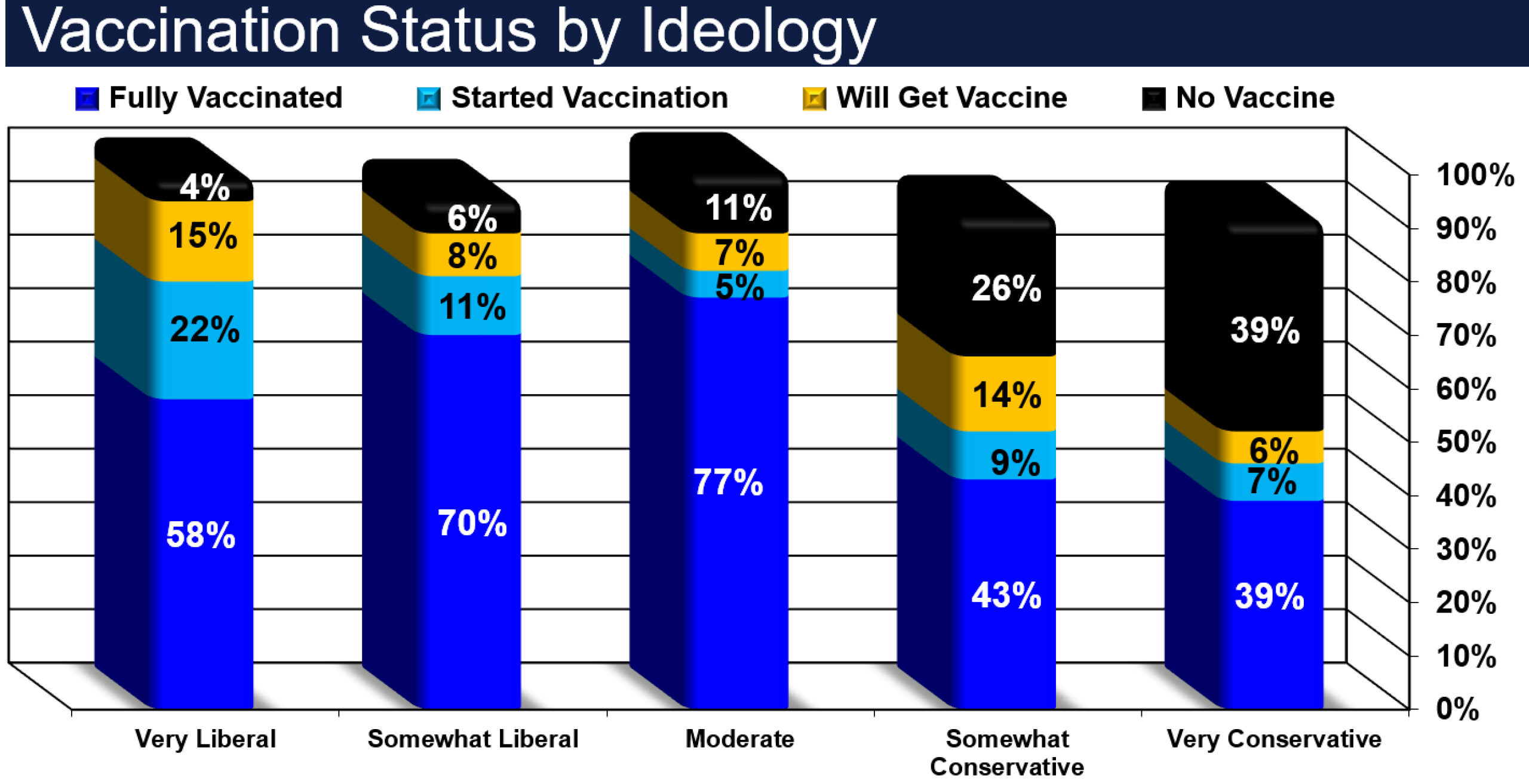
We also see age and ideological lines regarding vaccination status. Fully 78% of Oklahoma voters over the age of 65 have at least started the vaccination process – 73% are fully vaccinated. Among those under that age, 51% have started with 39% already finished and 27% say they will not get vaccinated. Among self-described liberals, 80% have at least begun vaccination, while that is only 48% of conservatives. Among the 36% of Oklahoma voters identifying as “very conservative” almost four-in-ten (39%) say they will not be vaccinated. This is only 5% among self-identified liberals.
Oklahoma’s populist tendencies are on full display when the issue of vaccination is taken from being a personal decision to a part of the employer / employee relationship. When asked to choose between allowing an employer to require a vaccination in order to protect customers and fellow employees or keeping this sort of personal health decision out of the workplace, Oklahoma voters come down on the side of employee rights. Only a third of voters believe an employer should have the right to require vaccinations while 61% oppose. The partisan gap on this is very wide with only 17% of Republicans supporting the employer rights and 77% opposing them. This is one issue where a majority of Democrats side with employer rights (54%) while 41% oppose letting employers have this ability. The ideological line on this question is also very strong.
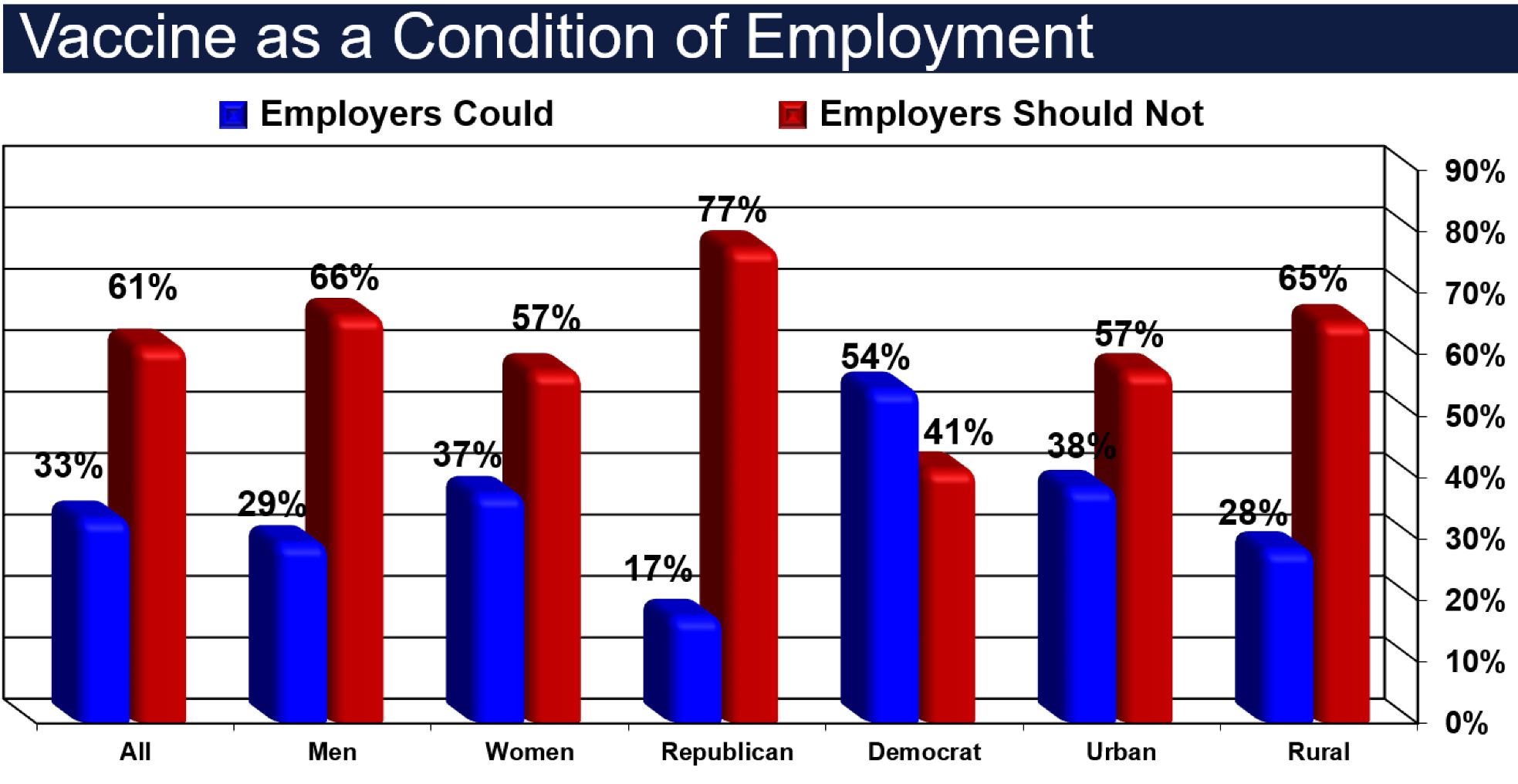
One thing is certain, the Coronavirus has become a very partisan and ideological issue. Not only that, but it is going to continue to be an issue as we emerge from the pandemic. It looks as if it, like gun rights are at times, may be an issue that divides the traditional Republican coalition of business interests and conservatives. While they tend to agree on regulatory and tax issues, these sort of personal liberty issues can put stress on that coalition (see recent discussions regarding transgendered athletes). The saving grace for this coalition may be that Democrats in Washington create an opponent that will bind them together. Stand by for another Sooner Survey on this topic soon. ♦

1. Thinking about your community, which is more concerning to you? (Rotate)
29% The health risk related to the spread of the coronavirus.
63% The economic damages such as loss of employment, wages, and retirement planning related to the virus.
8% (Do not read) Undecided
2. When do you expect the coronavirus outbreak to be controlled enough that people can safely attend gatherings of 10 or more people?
35% Now
4% End of April
9% End of May
6% End of June
21% Later in 2021
15% Longer than that
9% (Do not read) Undecided
3. Thinking about the coronavirus and vaccinations, which of the following is most accurate for you?
50% I have been fully vaccinated
10% I have started the vaccination process
10% I will get vaccinated in the future
23% I do not intend to get vaccinated
7% (Do not read) Undecided
4. Which of the following comes closest to your beliefs? (Randomize)
33% Employers should be able to require their employees to receive the Covid vaccine as they seek to protect other employees and customers. Employees who do not want to comply can choose to work for a different company.
61% Employers should not be able to require their employees to receive the Covid vaccine. Getting a vaccine should not be a condition of employment and this sort of personal health decision should not be any of the employer’s concern.
6% (Do not read) Undecided




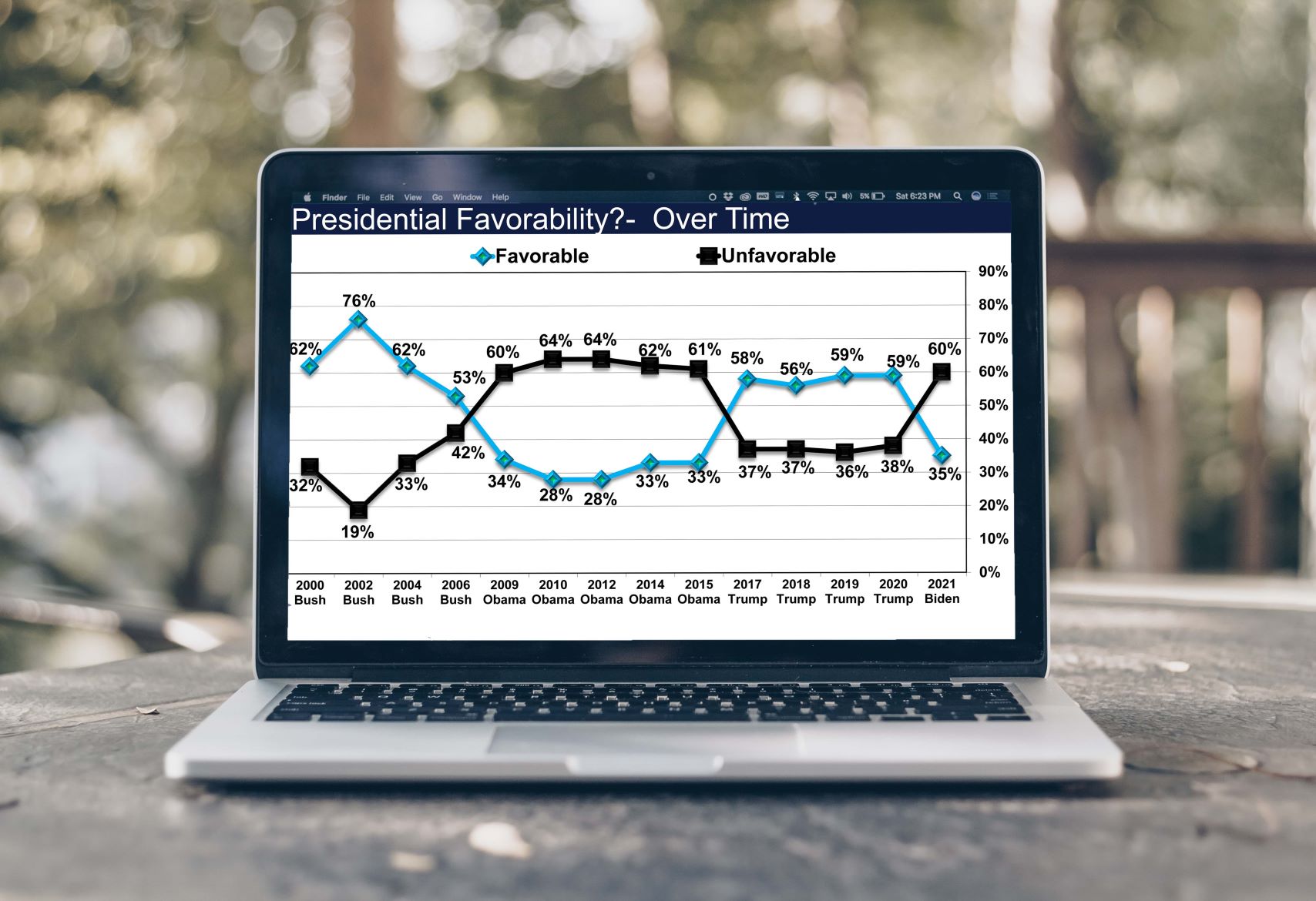
Recent Comments